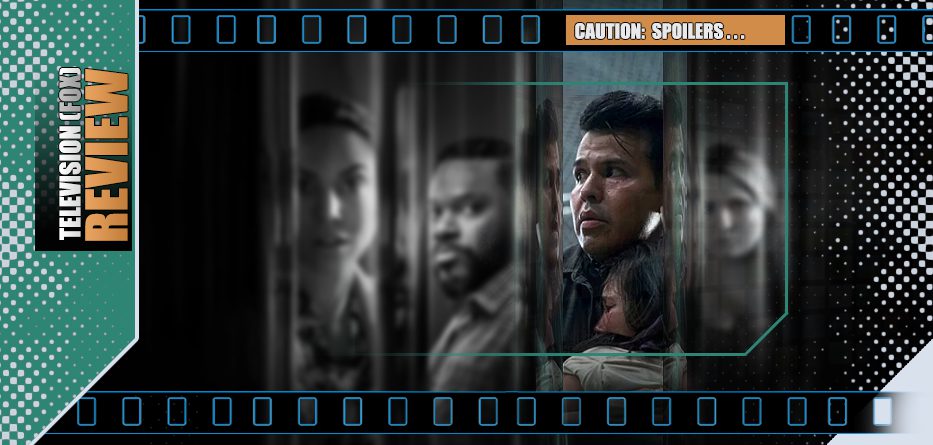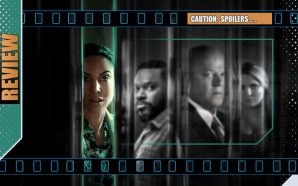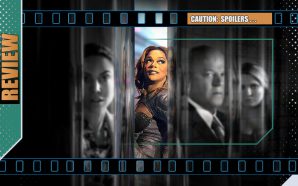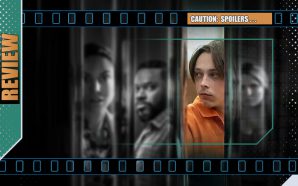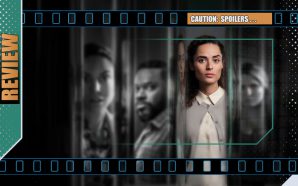Three Native Americans – Chase, Shandiin and Naataanii – are in court after the Uranium mining base on Navajo land is attacked in an effort to stop the drilling and the illnesses that may be linked to it. After a series of demonstrations, it appears they were tempted by another friend, Derrick (who had recently returned to the area to ‘help his people’) to go beyond their usual placards and actually invade and vandalise the facility.
Something clearly went wrong and now the charge is murder… and very few seem to want to abide by the wish to try the defendants through the law of the reservation itself. But what really happened on the night in question, why did Derrick really return to the tribe and how far are some people willing to go to make sure the charges stick?
*spoilers*
At its best, Accused has taken the opportunity to look at the fault-lines inside (and outside) the justice system, especially when there’s a tendency to have preconceptions about those involved and an outcome. It asks the audience to look at a developing character-arc and ponder how things may turn out, with or without malicious intent. In many cases, the result is not so much justice being served fairly as just being served cold, even if the audience feels some sympathy for those involved. After turning its judicial spotlight at the way people of colour, the deaf and even teenagers are seen before an (often) unsympathetic jury (and often seen as underdogs by the audience) and using writers and directors familiar with those struggles, here it’s the turn of Native Americans as a group to feel the gavel of misfortune… and it’s clear that the odds are stacked against them from the outset. The writer/director is Reservation Dogs‘ Tazbah Chavez, a long-time campaigner for environmental justice and Native American rights.
We open with not one but three people in the dock for a crime that will become clearer as things progress. All the defendants are Native American but being tried in a mainstream court, where even the judge doesn’t feel inclined to abide by tribal introductions from the Navaho lawyer or other traditions. We can see the defendants all react a little differently to the predicament in which they find themselves. There’s Chase (Forrest Goodluck), a young hothead who is consistently making it known the contempt he feels for the court; there’s Shandiin (Natalie Benally) who remains quiet but clearly troubled by her experience and there’s Naataanii (Robert I. Mesa), a tall, broad man who is quietly stoic – no less aggrieved by events but the kind of man who desperately clings to the belief things will work out if you follow the rules. Though the title of the episode suggests we’re seeing events through his eyes, it’s really quite the ensemble experience with several scenes from other perspectives – something different from most of the preceding entries.
In the flashback we start with an angry confrontation between Native Americans and the police at a demonstration against mining for Uranium on Navajo land. There’s no doubt that the demonstrators are handled roughly and likely unfairly, many eventually thrown into cages for the night and faced with minor charges to deter them. (However it’s also interesting that the episode shows that it’s not entirely black-and-white. Chase definitely tries to provoke a reaction and gets it – along with everyone else while Naataanii is as proud as any of them, but is looking to resolve the matter more preacefully through intermediaries and the tribal council).
Kiowa Gordon plays Derrick, who left the area years ago for a ‘better’ life in Los Angeles, with an edge and it’s clear there’s more to his story than we initially know. Derrick says it’s out of loyalty to his people, he’s somewhat evasive about the ‘success’ he’s had and it’s clear that some of the attitudes that drove him away are still lingering. But with the people on the reservation going increasingly frustrated, it’s interesting how quickly his plans for far more direct action take root in a community needing a victory.
As plans progress to invade a mining facility and smash its computer (thus halting the mining operation indefinitely) the question for the audience becomes what happened later? Viewers noting that the charge against the defendants is murder and Derrick is not on trial will begin to suspect where things are heading… but how and why? Like many weeks’ stories there’s a feeling of impending doom that draws you in… to the whys as much as the whats. Like a good play with a weapon moving from person to person, it’s just a matter of when the ‘music’ will stop and who will end up firing it and how Derrick likely ends up the victim. This is also the first episode to deal not just with the unknown nature of the crime but with overt corruption, with the revelation of the full-picture before we’re done. The early presumption is that it will be the hot-headed, reactionary Chase who fires the weapon, or perhaps Shandlin or Naataanii in an ill-judged moment… but no. It turns out that the weapon was – as testified – left behind in the control room with Chase, Shandlin, Naataanii and Derek all surrendering peacefully. It’s the corrupt FBI agent who absolutely murders Derrick in cold blood as part of a cover-up, relying on the loyalty of his team and the innate prejudices of people looking after their own interests.
Dash Mihok makes the corrupt FBI handler (who, unless I’m wrong, is never actually named) sleazy and opportunistic enough for us to hate from the revelation of his identity and role in events. The only thing is that his actions are so brazen and manipulative that some of it seems a little too blatant to ring true – not that someone couldn’t commit such acts, but it feels that to do is so openly and with such disregard for witnesses, would be unlikely to have everyone towing the line to cover for him. (Then again, the treatment of the Native Americans throughout the episode – either through direct or casual racism – and in real-life cases, does often indicate a wholesale double-standard at work). Even the security guard who we think might reveal the truth has apparently been bought off and backs the FBI’s version of events.
Bearing in mind the events at the very end of the episode – the Native American court official realising the FBI agent is up to no good and how she surreptitiously records the intimidating (and incriminating) conversation he has with Naataanii – and thus turning around an outcome that seemed destined for a guilty verdict – means this is something of another wish-fulfilment entry with such a last-minute save…rather than how likely it would likely play out… but it’s one that is satisfying and hits all the right buttons along the way.
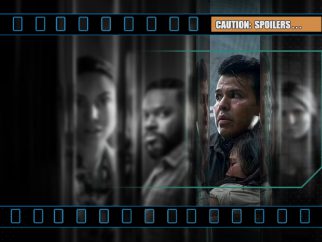
- Story8
- Acting9
- Direction9

